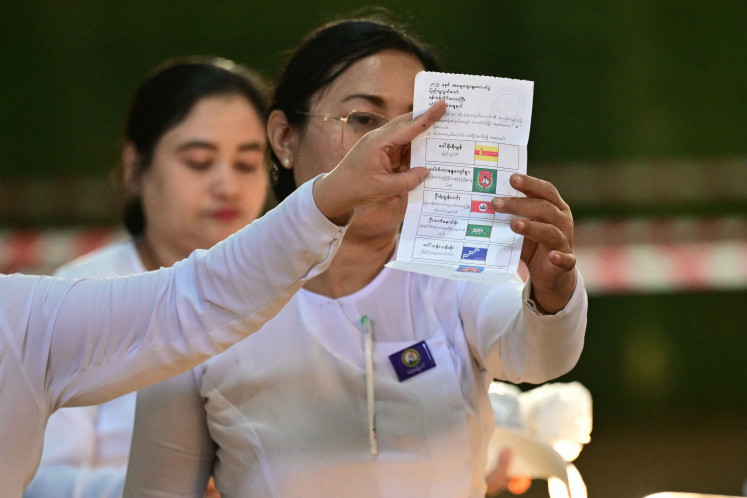Popular Reads
Top Results
Can't find what you're looking for?
View all search resultsPopular Reads
Top Results
Can't find what you're looking for?
View all search resultsAnalysis: Rejection of APBN use, uncertainty in Luhut's family office plan
Change text size
Gift Premium Articles
to Anyone
T
he proposal to establish a family office, a private investment entity, from National Economic Council (DEN) head Luhut Binsar Pandjaitan has recently returned to the public spotlight after Finance Minister Purbaya Yudhi Sadewa rejected the use of the state budget (APBN) to fund the venture. Purbaya said the family office project must be developed entirely through DEN's own resources, emphasizing that the Finance Ministry had no role in designing or planning the project. Luhut responded by pointing to a misperception regarding the proposal, clarifying that the planned project had nothing to do with the state budget. Details of the initiative remain vague, however, so it is uncertain how the new entity will be structured and financed.
Although Luhut has never explicitly stated that the state budget would be used to finance the initiative, he did suggest that it would receive substantial fiscal incentives. He promised that ultrarich families relocating their assets to Indonesia under the family office framework would be granted a tax incentive of zero percent during that phase. Once onshore, these funds would be invested in domestic projects and later become subject to regular taxation during their implementation. Potential investment targets include government-backed ventures, including national strategic projects (PSN).
Following Purbaya's clarification, DEN officials reaffirmed that the family office plan would proceed without funding support from the state budget, at least during the initial development phase. However, questions remain about the initiative's structure, governance and broader fiscal implications. Even the finance minister has admitted to fully understanding the project's concept, a sentiment shared by many observers, given the lack of clarity surrounding its operating model. At first glance, the initiative appears to resemble a privately managed hedge fund, albeit one directed primarily toward public investment projects rather than purely commercial opportunities.
This lack of clarity has raised concerns. Taxation of high-net-worth individuals and large corporations is one of the fiscal pillars and contributes substantially to Indonesia's non-oil and gas tax revenues. In 2024, for instance, corporate income tax accounted for 28.8 percent of total tax receipts, underscoring its central role in financing the state budget. Offering a tax incentive of zero percent, even temporarily, would represent a major shift from established fiscal norms and could create a short-term gap in revenue collection. This explains why many were surprised to learn that the Finance Ministry was not involved in designing the family office initiative.
According to Luhut, the family office will reinvest the funds it manages into profitable domestic projects. However, the government's current focus on large-scale, budget-heavy programs may limit the family office's flexibility. If the new entity is expected to finance only government-backed or PSN, its investment portfolio would lack the diversity typically seen in hedge funds or sovereign wealth funds, thereby increasing its exposure to risk. This raises doubts about investor appetite, and whether the promise of an initial tax holiday will be sufficient to compensate for the risks of a narrow, policy-driven investment mandate.
Beyond fiscal and investment concerns, significant legal and institutional challenges also remain. The family office is set to operate in a special economic zone, which is regulated to uphold international standards and best practices. One proposal under consideration is that the family office initiative adopt common law principles alike major global financial centers. Yet this approach could prove difficult to reconcile with Indonesia's civil law system, potentially complicating implementation and oversight. At this stage, the family office remains a concept under consideration rather than a finalized policy framework, with key details including funding, governance and legal foundation still unresolved.
Luhut has consistently described the initiative's broader vision as an effort to repatriate global wealth of around US$11 trillion from conglomerates, particularly from emerging and least developed economies. If even a fraction of this capital could be drawn back to Indonesia, the family office would command immense financial capacity, opening new possibilities for investment and long-term economic development. However, whether the initiative can realistically attract this wealth amid legal, fiscal and governance uncertainties remain an open question.



















